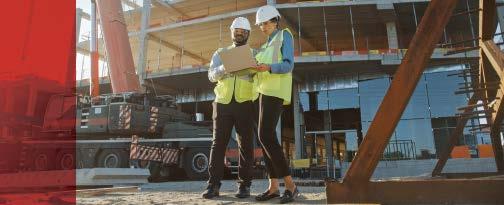


Ahead of this Spring’s Federal Election, the Calgary Construction Association is proud to release our Federal Policy Platform. Titled, “Building a Strong Calgary in a Strong Canada,” the following platform highlights challenges and opportunities for Federal policymakers as they contemplate the role Calgary’s construction industry has in building a better city, province and nation.
Through consultation with our community, and Board of Directors, our Calgary-specific plan is divided into four sections specific to our local environment. Moreover, we are proud to join our national counterpart, the Canadian Construction Association, in unveiling their national election platform, “Construction for Canadians”, which can be found at construction4cdns.ca.
About the Calgary Construction Association:
Formed in 1944, the Calgary Construction Association (CCA) is a professional association of over 850 member companies throughout the Calgary region. Through our partnerships with the residential and commercial construction industry, we represent over 100,000 Calgarians employed in the industry and their families. As an advocate for the construction industry, our mission is to help our members thrive now and into the future.
Construction in Calgary and Alberta:
Construction plays a significant role in both Calgary and Alberta’s economy. According to the City of Calgary, construction contributed about 8.6 percent of the City’s total GDP – a figure that excludes manufacturing, logistics, most office roles, and many more. According to the Government of Alberta, construction contributed over $27 billion to the Alberta economy in 2024 and represented over $52.3 billion of investment.
In 2024, Calgary saw a record 21,300 new housing starts, the highest on record for the third year in a row, which was driven by population growth leading to strong housing demand. Calgary’s annual population growth has surpassed all expectations, growing 6 percent over 12 months through July 1, 2024.



Addressing the Skilled Labour Shortage
Calgary continues to experience severe labour shortages in construction and construction management roles. According to Statistics Canada, in the third quarter of 2024, the Calgary Economic Region reported 5,890 job vacancies across key trades and construction-related management roles, from a total of 26,345 total vacancies in the region. The proportion of construction and trade roles within the total job vacancies remained steady at 22 percent of all total vacancies.
Provincially, Alberta’s construction industry is facing an increasingly critical workforce gap, with over 40,000 skilled workers needed by 2030 due to retirements and industry growth. Without action, the province risks delays and rising costs for critical infrastructure projects.
Policy Solution: A Restoration and Expansion of the Provincial Nominee Program
The Provincial Nominee Program (PNP) allows Alberta to select immigrants based on local labour market needs, ensuring that skilled trades workers—such as carpenters, electricians, welders, and heavy equipment operators—can fill crucial vacancies. By expanding the PNP, the province can secure a strong pipeline of skilled labour, preventing major infrastructure projects in Calgary and Alberta from facing costly setbacks due to labour shortages.
The number of allocations to the PNP is determined by the Government of Canada, which the Province of Alberta processes through the Alberta Advantage Immigration Program. In 2025, the Alberta Advantage Immigration Program (AAIP) received an allocation of 4,875 nominations from Immigration, Refugees and Citizenship Canada (IRCC), representing a 50 percent reduction compared to the 9,750 nominations allocated in 2024. In response, in Budget 2025, the Government of Alberta called on the Government of Canada to expand the number of allocations.
Faster & More Targeted Immigration Pathway
The Federal Express Entry system often prioritizes higher education over skilled trades, making it difficult for construction workers to qualify for permanent residency. This creates a barrier for the very workers Alberta needs the most.
Expanding the Provincial Nominee Program (PNP) would be a practical and immediate solution to addressing Calgary and Alberta’s labour shortages, supporting infrastructure growth, and strengthening the construction industry.
The Calgary Construction Association advocates for:
More PNP allocations for skilled construction workers.
Faster processing times to get workers on job sites quickly.
Targeted pathways to permanent residency for essential trades.
These changes would help Alberta’s builders complete projects on time, support business growth, and keep the province competitive in Canada’s construction sector.



A skilled and well-trained workforce is the foundation of a thriving construction industry. Access to training programs that help workers develop new skills, adapt to technological advancements, and meet industry demands is essential for long-term success.
One such program, the Canada-Alberta Job Grant (CAJG), played a critical role in workforce development by funding employer-led training. The program covered up to two-thirds of eligible training costs, making skills development more accessible, particularly for small and medium-sized businesses. However, in August 2024, Alberta suspended new CAJG applications due to a $70.8 million reduction in federal Labour Market Transfer Agreement (LMTA) funding. This decision has strained Alberta’s construction industry, making it harder for companies to invest in workforce development. With over 5,890 job vacancies in Calgary’s construction sector alone (Q3 2024), the loss of this funding exacerbates the skilled labour shortage, limiting industry growth.
The Apprenticeship Incentive Grant (AIG) and Apprenticeship Completion Grant (ACG) further supported workforce development by reducing financial barriers for apprentices. These grants provided critical funding to cover tuition, tools, and living expenses, making it easier for individuals—especially those from underrepresented backgrounds—to enter and complete skilled trades training. Their suspension has created additional challenges in attracting and retaining apprentices, increasing the risk of a long-term labour shortage.
The Apprenticeship Service Grant was another initiative that encouraged small and medium-sized enterprises (SMEs) to hire first-year apprentices in 39 Red Seal trades by offering $5,000 per apprentice, or $10,000 for apprentices from equity-deserving groups. Beyond financial incentives, the program helped employers with onboarding and creating inclusive workplaces. As of July 2024, this program is under review, and applications are not currently being accepted.
The Calgary Construction Association (CCA) strongly advocates for the reinstatement of these essential programs. Policymakers must restore LMTA funding, ensure stable employer-led training programs, and expand industry consultation to develop responsive, employer-driven workforce solutions. Without these programs, Canada’s construction industry risks falling behind, facing increasing labour shortages, and struggling to meet infrastructure demands.
The Calgary Construction Association urges policymakers to:
Restore LMTA funding to reinstate the Canada-Alberta Job Grant.
Ensure long-term stability for for programs like the Apprenticeship Incentive Grant, Apprenticeship Completion Grant, and the Apprenticeship Service Grant
Expand industry consultation to develop responsive, employer-driven workforce development solutions.

The Calgary Construction Association (CCA) advocates for strategic investments in infrastructure to build a stronger, more connected, and more economically competitive Calgary. From transit expansion to trade-enabling infrastructure, the future of Calgary depends on the right projects moving forward with certainty and adequate funding.
Prioritizing the Green Line LRT Expansion
The Green Line LRT is Calgary’s largest infrastructure project, set to transform mobility and drive economic growth. However, while current funding ensures construction from Shepard to the new Event Centre, uncertainty remains about the critical connection to Eau Claire, Calgary’s North (including Carrington), and Seton in the deep south. Without a full build-out, the city risks missing the full benefits of an integrated transit system that connects communities, reduces congestion, and supports economic growth.
CCA calls on all levels of government to:
Secure full funding to complete the Green Line to both Eau Claire and North Calgary. Ensure long-term commitment for the Carrington and Seton extensions.
Streamline project delivery to prevent unnecessary delays and cost escalations.
A piecemeal approach to the Green Line will limit its impact—Calgary needs certainty and a fully connected transit system that meets future demand.
Advancing Calgary as a Prairie Economic Gateway
Infrastructure investment goes beyond transit—positioning Calgary as an inland port is essential for the province’s long-term economic success. The Prairie Economic Gateway Initiative aims to establish Calgary as a major logistics and trade hub, strengthening Alberta’s role in national and international supply chains.
CCA supports the development of Calgary as a logistics powerhouse by advocating for:
Infrastructure funding for intermodal hubs, warehousing, and transportation corridors that enable efficient goods movement.
Regulatory streamlining and investment incentives to attract logistics and distribution companies.
Enhanced connectivity between road, rail, and air transport to strengthen Calgary’s role as the central gateway to Western Canada and beyond.
The Calgary Construction Association urges governments to prioritize these investments in transit and trade infrastructure to secure Calgary’s future as a strong, connected, and economically resilient city. Now is the time to build.

As Canada’s energy capital, Calgary is home to the companies, workforce, and infrastructure that drive the nation’s energy industry. The Calgary Construction Association (CCA) advocates for policies that support responsible energy development, modern infrastructure, and workforce readiness to ensure Canada remains a global leader in energy production.
Investing in Energy Infrastructure
Energy projects are a key driver of Alberta’s economy, creating jobs and generating long-term economic benefits. The CCA supports:
The expansion of pipeline capacity and energy export infrastructure to improve market access for Canadian energy.
Investment in Alberta’s power grid and industrial infrastructure to meet growing demands and strengthen reliability.
Innovation in modular and industrial construction to improve efficiency and cost effectiveness in energy projects.
Ensuring Regulatory Certainty and Investor Confidence
To attract continued investment and keep energy projects moving forward, a clear and predictable regulatory framework is essential. The CCA calls for:
Streamlined approval processes that reduce delays and encourage new development. A competitive business environment that fosters industry investment and job creation. Collaborative partnerships between government, industry, and Indigenous communities to strengthen project certainty.


